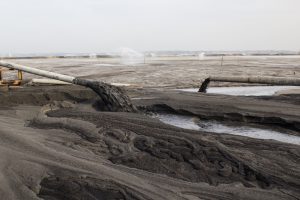A three-judge panel of the D.C. Circuit Court of Appeals delivered a win for the EPA on June 28, 2024, when it decided to dismiss Electric Energy Inc. (EEI), et al., v. EPA, et al. In the suit, a group of power generating companies sued the EPA, challenging its interpretation of its 2015 coal combustion residuals (CCR) rule.
The companies’ legal arguments focused on proving the CCR rule was the equivalent of a “legislative rule” and on the definitions of “liquid” and “infiltration” as used within the rule.
The CCR rule was created after a couple of devastating spills in North Carolina and Tennessee, media organization Grist notes.
The rule classified unlined coal residual units as open dumps that were required to stop receiving coal residuals and close by April 2021. The EPA offered an exemption allowing owners to extend the deadline, provided two conditions were met:
- “[N]o alternative disposal capacity is available on or off-site.”
- The owner or operator remains compliant with all the other requirements of the coal residuals regulations.
“The EPA’s rule required that coal ash, a byproduct of the coal power process which contains heavy metals like arsenic and mercury, cannot be left in contact with a ‘free liquid’ — one that could move in and out of the ash itself — and it had to be stored in a manner that prevented ‘infiltration’ by a liquid,” Grist adds. “[Lawyers for the] utility companies sued the EPA and argued that [the] rule’s prohibition of ‘infiltration’ of a coal ash impoundment refers only to infiltration from above, by rainwater. They also claimed that the rule didn’t classify groundwater as a ‘free liquid’ — although they acknowledged in their opening brief that ‘it may be true in a simplistic sense that ‘groundwater’ is a ‘liquid.’ By enforcing the rule using the common-sense definitions of these terms, the utilities argued, the EPA was effectively changing the rule itself.”
To many, the challenge seemed preposterous. After all, everyone knows the definitions of “liquids” and “infiltration.”
“These words are clear in their meaning. A liquid is a liquid, in any sense of the word, and infiltration means water coming in from any sides,” said Gavin Kearney, an attorney at Earthjustice who argued in the case as an intervenor on the EPA’s side, Grist continues.
Judge Cornelia Pillard, who authored the D.C. Circuit Court of Appeals opinion, agreed with Kearney in specifically rejecting any arguments related to the meanings of the two words.
What does it mean?
When coal-fired plants shut down, the EPA requires operators to ensure any remaining coal ash isn’t penetrable by rainwater and that the coal ash isn’t left in any manner that would result in groundwater contamination.
“However, in the years immediately following the rule’s passage, under the Trump administration — a period during which the EPA was briefly run by a coal lobbyist — the agency didn’t really enforce the rule,” according to Grist. “Power companies across the country quietly made plans to retire coal plants and, in many cases, simply ignored the rule banning permanent storage of coal ash in contact with groundwater. Under President Biden, the agency began enforcing the coal ash rule. There are over 100 sites nationwide where utilities plan to permanently bury coal ash where it was either in direct contact with groundwater or at imminent risk of contaminating it.”
The Georgia Environmental Protection Division (GEPD) received EPA authority in 2019 to issue coal ash permits. Georgia Power operates under this type of permit. Grist says the company’s plans were to leave “16 million tons of coal ash in unlined pits at Plant Scherer” in Juliette, Georgia.
“Some of the town’s residents are suing Georgia Power, alleging that the plant’s contamination of their drinking water was responsible for illnesses and deaths in the community. In 2022, the EPA notified Georgia regulators that their plans to approve a permit for Georgia Power to permanently store ash in contact with groundwater at its North Georgia facility Plant Hammond violated the 2015 rule,” Grist continues.
The GEPD approved the permit in what seems to be open defiance of federal regulators.
For now, industry analysts have adopted a “wait and see” attitude regarding the EPA’s next move. Some predict the Agency will step in and revoke the GEPD’s permit issuance authority based on the Agency’s recent decision to deny Alabama’s application to run its own coal ash disposal program.
“It’s time for federal intervention in Georgia since the state environmental protection agency continues to side with the fossil fuel industry,” said Frank Holleman, senior attorney for the Southern Environmental Law Center, according to Georgia Public Broadcasting. “[The GEPD] has made it clear that it will not follow the law and protect Georgia’s clean water and communities from toxic coal ash pollution. EPA is charged with overseeing [the GEPD’s] program, and we need EPA to step in to protect Georgia’s rivers and neighborhoods, because EPD will not.”
Multiple sources report that an EPA spokesperson said in an e-mail that the EPA and GEPD are “engaged in dialogue on closure strategies.”
“Until the EPA does intervene, Georgia Power has no plans to alter its plans, given that it’s already received a go-ahead from the state at one of its plants,” notes Grist. “It is important to note that EPA has previously approved Georgia’s state [coal ash] program with oversight by [the GEPD, which] evaluated our site-specific plans at Plant Hammond and issued the final permit in November 2023.”

